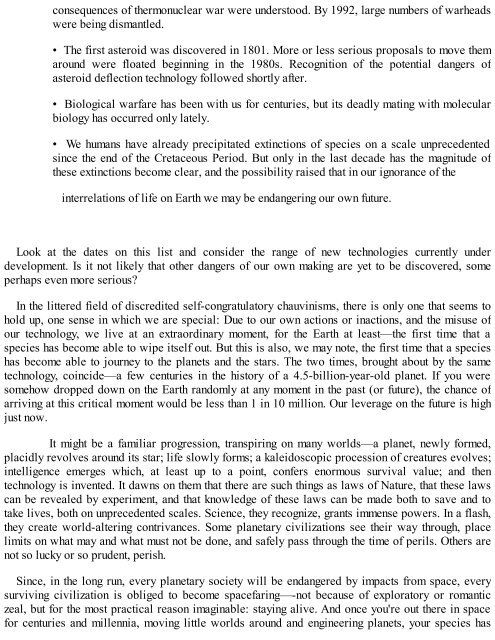Pale Blue Dot ( PDFDrive.com ) (1)
You also want an ePaper? Increase the reach of your titles
YUMPU automatically turns print PDFs into web optimized ePapers that Google loves.
consequences of thermonuclear war were understood. By 1992, large numbers of warheads<br />
were being dismantled.<br />
• The first asteroid was discovered in 1801. More or less serious proposals to move them<br />
around were floated beginning in the 1980s. Recognition of the potential dangers of<br />
asteroid deflection technology followed shortly after.<br />
• Biological warfare has been with us for centuries, but its deadly mating with molecular<br />
biology has occurred only lately.<br />
• We humans have already precipitated extinctions of species on a scale unprecedented<br />
since the end of the Cretaceous Period. But only in the last decade has the magnitude of<br />
these extinctions be<strong>com</strong>e clear, and the possibility raised that in our ignorance of the<br />
interrelations of life on Earth we may be endangering our own future.<br />
Look at the dates on this list and consider the range of new technologies currently under<br />
development. Is it not likely that other dangers of our own making are yet to be discovered, some<br />
perhaps even more serious?<br />
In the littered field of discredited self-congratulatory chauvinisms, there is only one that seems to<br />
hold up, one sense in which we are special: Due to our own actions or inactions, and the misuse of<br />
our technology, we live at an extraordinary moment, for the Earth at least—the first time that a<br />
species has be<strong>com</strong>e able to wipe itself out. But this is also, we may note, the first time that a species<br />
has be<strong>com</strong>e able to journey to the planets and the stars. The two times, brought about by the same<br />
technology, coincide—a few centuries in the history of a 4.5-billion-year-old planet. If you were<br />
somehow dropped down on the Earth randomly at any moment in the past (or future), the chance of<br />
arriving at this critical moment would be less than 1 in 10 million. Our leverage on the future is high<br />
just now.<br />
It might be a familiar progression, transpiring on many worlds—a planet, newly formed,<br />
placidly revolves around its star; life slowly forms; a kaleidoscopic procession of creatures evolves;<br />
intelligence emerges which, at least up to a point, confers enormous survival value; and then<br />
technology is invented. It dawns on them that there are such things as laws of Nature, that these laws<br />
can be revealed by experiment, and that knowledge of these laws can be made both to save and to<br />
take lives, both on unprecedented scales. Science, they recognize, grants immense powers. In a flash,<br />
they create world-altering contrivances. Some planetary civilizations see their way through, place<br />
limits on what may and what must not be done, and safely pass through the time of perils. Others are<br />
not so lucky or so prudent, perish.<br />
Since, in the long run, every planetary society will be endangered by impacts from space, every<br />
surviving civilization is obliged to be<strong>com</strong>e spacefaring—-not because of exploratory or romantic<br />
zeal, but for the most practical reason imaginable: staying alive. And once you're out there in space<br />
for centuries and millennia, moving little worlds around and engineering planets, your species has


